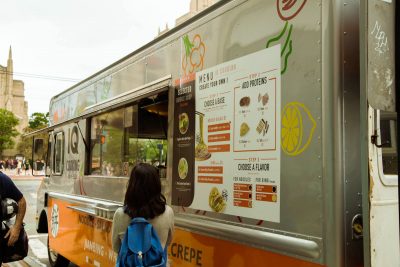
On most sunny days, a line of students file out onto the College of Communication lawn as they wait to purchase lunch from a food truck. Wafts of the cooking food notify people near the area where the truck is located.
Depending on the day, students can grab Asian cuisine, rice burgers or pizza on-the-go.
Food trucks are a common site across the city, and according to a 2015 report by statistics website Statista, the food truck industry in the United States was estimated to be worth $856.7 million. The same report states that by 2020, the food truck industry would be worth nearly $1 billion.
However, for some food trucks, metrics don’t tell the whole story.
Doug Burrell, owner of the Boston-based Big Daddy Hot Dogs food truck, said recent times have been financially difficult for the truck after he received a bad pick in the food truck lottery.
The City of Boston permitted food trucks to operate after passing an ordinance in 2011, and trucks operating within the city must comply with the rules and regulations. Truck locations are categorized into three zones.
Zone 1 includes high-traffic areas that are competitive, and trucks that wish to work at any of these spots must enter the lottery for access. After a year, they may lose their right to work at the location when the lottery turns over.
Zones 2 and 3 have three-year permits, and food trucks can select these spots on a first-come, first-serve basis. The BU West food truck spot falls into Zone 2.
Although Burrell said the lottery is often fair, a bad selection number can have major detrimental impacts on a business.
“The problem is the way the system is set up right now,” Burrell said. “I didn’t get any good picks … It’s been kind of a challenge for us for 2018.”
Burrell said that one day, he only had six customers for lunch at his main location in Newmarket Square.
“I ended up with a deficit,” Burrell said. “I pay my guys $14 an hour … That’s how you go out of business.”
Yet whenever the Big Daddy Hot Dogs truck was stationed on the Charles River Campus by Agganis Arena, Burrell said he experienced a boost in business.
“It’s not just the fact you’re on a college campus,” Burrell said. “It’s the location of your truck — location, location, location.”
Even at other points on BU’s campus, Burrell said he found his business suffered because either the truck was in the spot at a poor time of the day or students that were walking past were less likely to stop there.
Jessica Shen, the owner of Rice Burg, said BU students play an important role in her decision process when determining where she wanted to park the truck.
“I bring [my food truck] to BU because a lot of students like rice burgers,” Shen said. “So, we pick places where students are.”
















































































































